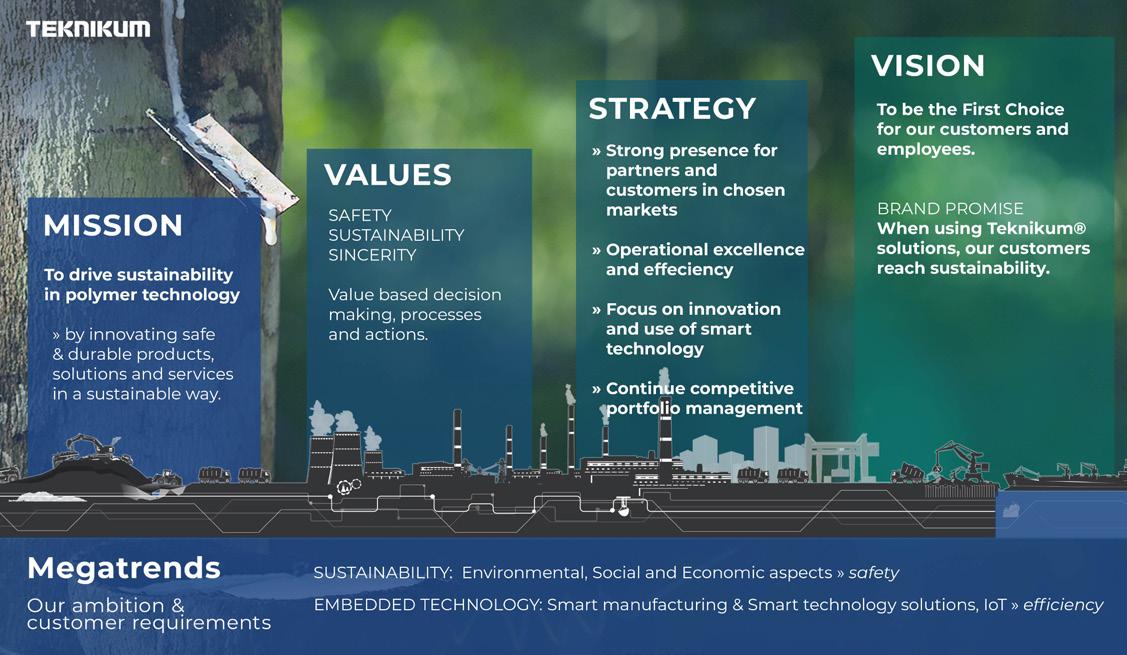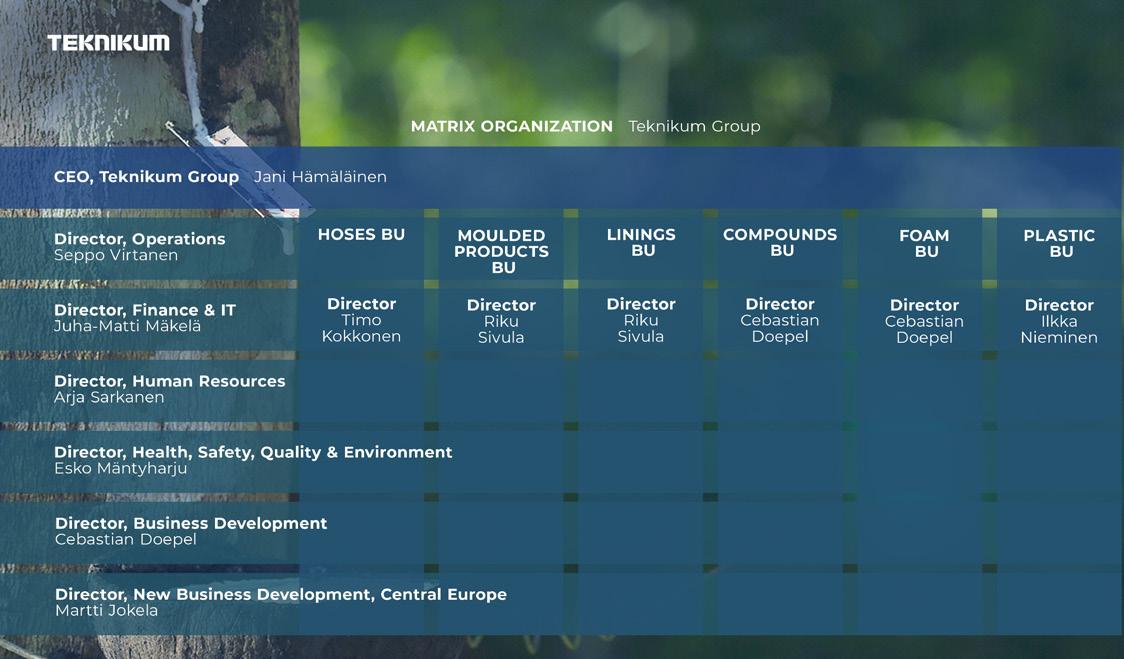
5 minute read
Responsible leadership at Teknikum
Creating solutions together Globally, Teknikum offers sustainable and eco-friendly polymer products and related services created together with customers and partners in cooperative product development projects.
We value long-term customer relationships and the systematic expansion of our customer base.
Values
Teknikum Group’s values are Safety, Sustainability and Sincerity.
Mission
To drive sustainability in polymer technology.
Vision
To be the first choice for our customers and employees. We have defined the governance principles at Teknikum Group. We follow these principles on the board level and in our leadership team.
The main principles: • Define the rights and responsibilities in relationships between shareholders, the board, the CEO and his direct subordinates. • Describe the structure of the organization and the methods used to achieve the goals of the company/ group. • Ensure shareholder interests are respected in company and group operations.
The principles cover the decision-making process, practices and structures that help to achieve the set goals. The principles also describe the frameworks where rights and responsibilities are used. In practice, implementing the principles requires everyone working for the group being informed about their area of responsibility and the extent of their decision-making authority and acting accordingly.
The goal of the principles is to stress individual responsibility alongside the importance of acting in concert and quality leadership for a supportive working environment.
The group has convergent quality, environmental, procurement and safety policies as described in the following pages.


Equal opportunity plan
General Employers will promote gender equality in working life in a purposeful and systematic manner. To promote equality in working life, employers will, while taking account of the resources available and other matters affecting the issue:
1. Ensure that both women and men are recruited for open positions 2. Promote the equal placement of women and men in different positions and create equal opportunities for their career development 3. Promote equality between women and men in employment conditions, particularly when it comes to wages 4. Create a suitable working environment for both women and men 5. Facilitate the work-life balance of women and men by paying attention to how work is organized in particular 6. Act to prevent gender-based discrimination
An annual separate review of equality issues is conducted in the leadership team. As a result, possible developmental measures are drawn up. Personnel planning and personnel recruitment Personnel planning and recruitment are used to promote the development of greater equality in the organization. Personnel shall be guaranteed equal opportunities for career development regardless of gender. Personnel receive training to support them in developing their careers. Access to training is made equally available to male and female personnel. Responsibilities and job advertisements will consider how members of both sexes will be recruited for the position.
Leading and developing personnel Equality is a natural part of leadership. Company leadership supports and encourages personnel equally to accept responsibility, to develop their career, to seek training, to use comprehensive knowledge and skills, and to achieve great results. Leadership promotes equal opportunities among personnel to participate in planning operations, production and decision-making.
Training and development plans for personnel are designed to support the promotion of equality. When personnel return from family leave and from other long-term leaves, orientation and supplemental training are organized for them.
Supervisors ensure that gender-based harassment or intimidation does not occur at the workplace. There are separate guidelines for what to do should harassment or intimidation occur.
Pay and how work is organized When deemed necessary, pay and pay structures will be surveyed and possible factors for differences in pay between women and men for the same or equivalent work will be identified.
The pay system has been developed to promote gender equality by setting pay based on job requirements, the professional success of employees and their results.
When increasing work flexibility, attention must be paid to the effects of how work is organized on equality. Organizing working hours appropriately promotes performance and employee satisfaction. Taking personal needs into account when allocating working hours, improves opportunities for managing the work-life balance for both women and men.
Personnel participation Equality is a joint effort and it must be a natural part of all common operations. Ensuring the equal participation of personnel is a prerequisite for promoting equality in working life.
Women and men will have equal opportunities to participate in and influence production and decision-making at all levels. When possible, both women and men will be selected for planning and other similar working groups.
Working conditions The working environment will be developed to ensure comprehensive equality. As personnel age, attention will be paid to the wellbeing of personnel, particularly for those doing mental and physical work.
The working conditions of pregnant personnel receive attention.
Work and social spaces, equipment, jobs, uniforms and other provisions will not be barriers to achieving gender equality.
Improving the atmosphere at work promotes the achievement of equality.
Communication and monitoring The equality plan is published for personnel through internal newsletters. It is also available from payroll points.
The implementation of the equality plan is monitored by the leadership team.
Certificates
Our operations are based on different standards and guidelines for the operations system created on their basis. We monitor the effectiveness of our operations system with regular and scheduled internal audits.
We work in line with our documented and certified quality systems:
• The Teknikum plants in Finland have ISO 9001:2015,
ISO 14001:2015 and ISO45001:2018 certificates. The certificates were provided by DNV. • The Teknikum plant in Hungary has quality management system according to ISO 9001: 2015 and
ISO14001:2015 and IATF 16949: 2016 standards. The certificates were provided by NQA.
Teknikum factories in Finland have environmental permits by Centre for Economic Development, Transport and the Environment.
Stakeholders
Our most important stakeholders are customers, suppliers, personnel and shareholders.
Our customers are principally composed of representatives of different industrial sectors. These days, our biggest customer groups are in the mineral technology, railway industry, mechanical engineering and transportation industries, plus resellers in Finland and the rest of the world.
Teknikum Group is a privately-owned enterprise.
Our other stakeholders include investors, insurance firms, universities, the local community and authorities, and other organizations. Collaboration with our stakeholders makes our operations possible.
Teknikum Group is a member of relevant essential and supporting organizations and associations.



